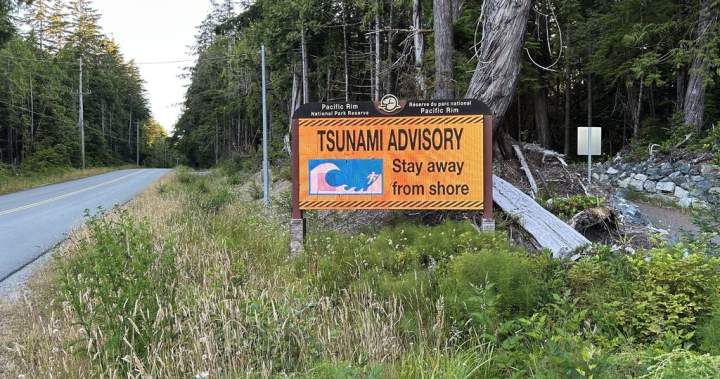A tsunami advisory remains in effect for parts of coastal British Columbia after a magnitude 8.8 earthquake hit the Far East region of Russia overnight.
The advisory, which was upgraded from a watch late Tuesday night, covers the North Coast and Haida Gwaii; the Central Coast and Northeast Vancouver Island, including Kitimat, Bella Coola and Port Hardy; the West Coast of Vancouver Island from Cape Scott to Port Renfrew; and the Juan de Fuca Strait from Jordan River to Greater Victoria, including the Saanich Peninsula.
According to Emergency Info BC, tsunami waves were expected to hit Langara Island at about 10:05 p.m. Pacific daylight time (PDT), with Tofino to see waves at about 11:30 p.m. on Tuesday.
There has been no immediate confirmation of their arrival as of Wednesday morning.
The U.S. National Oceanic and Atmospheric Administration, however, notes in regional observations that an “observed maximum tsunami height” of six centimetres was observed at Langara Island, with 27 cm seen at Winter Harbour, 21 cm at Tofino and nine cm at Bamfield.
The agency warns people in B.C. to stay away from the shore due to concerns about strong currents, warning that both waves and currents can drown or injure people in the water.

Get breaking National news
For news impacting Canada and around the world, sign up for breaking news alerts delivered directly to you when they happen.
People are also advised not to go near the shore to observe the currents or waves.
Japan’s Meteorological Agency said a tsunami as high as 40 cm was detected in 16 locations as the waves moved south along the Pacific coast.
Several countries issued tsunami watches, advisories and warnings as a result, though as of Wednesday morning, some of the warnings in Hawaii, Japan and other parts of Russia have been downgraded.
A warning is the most serious type of tsunami alert, while an advisory, like what’s in place for parts of B.C., means there is the potential for strong currents and dangerous waves, as well as flooding on beaches or in harbours.
The waves were triggered by what is believed to be the strongest recorded quake since the 2011 earthquake that hit Japan and caused a massive tsunami.
Several people were injured in Russia, but no deaths have been reported so far.
— with files from The Canadian Press and The Associated Press
Read the full article here

